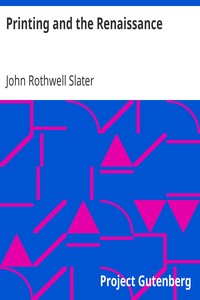Printing and the Renaissance by John Rothwell Slater
"Printing and the Renaissance" by John Rothwell Slater is a historical account written in the early 20th century, specifically in the early 1920s. This book examines the pivotal role that printing played in the cultural and intellectual transformations during the Renaissance period, exploring how various printers contributed to the dissemination of knowledge and literature across Europe. In this insightful paper, Slater delves into the evolution of printing before and during the Renaissance,
highlighting significant figures such as Aldus Manutius, Robert Estienne, Johann Froben, Anton Koberger, and William Caxton. He argues that it was the intellectual revival of the Renaissance that stimulated the advancements in printing technology, rather than the other way around. Through detailed examples of printing practices, the types of works published, and the relationship between printers and scholars, Slater illustrates how the spread of printed materials facilitated the exchange of ideas, ultimately shaping modern civilization. The paper discusses the intricate connections between the newly accessible literature, humanism, and the reformation of religious thought, painting a composite picture of an era defined by its vigor and complexity. (This is an automatically generated summary.)
Read or download for free
| How to read | Url | Size | |||
|---|---|---|---|---|---|
| Read now! | https://www.gutenberg.org/ebooks/26029.html.images | 85 kB | |||
| EPUB3 (E-readers incl. Send-to-Kindle) | https://www.gutenberg.org/ebooks/26029.epub3.images | 214 kB | |||
| EPUB (older E-readers) | https://www.gutenberg.org/ebooks/26029.epub.images | 214 kB | |||
| EPUB (no images, older E-readers) | https://www.gutenberg.org/ebooks/26029.epub.noimages | 93 kB | |||
| Kindle | https://www.gutenberg.org/ebooks/26029.kf8.images | 424 kB | |||
| older Kindles | https://www.gutenberg.org/ebooks/26029.kindle.images | 414 kB | |||
| Plain Text UTF-8 | https://www.gutenberg.org/ebooks/26029.txt.utf-8 | 74 kB | |||
| Download HTML (zip) | https://www.gutenberg.org/cache/epub/26029/pg26029-h.zip | 217 kB | |||
| There may be more files related to this item. | |||||
Similar Books
About this eBook
| Author | Slater, John Rothwell, 1872-1965 |
|---|---|
| LoC No. | 23000577 |
| Title |
Printing and the Renaissance A paper read before the Fortnightly Club of Rochester, New York |
| Credits |
Produced by Emmy and the Online Distributed Proofreading Team at www.pgdp.net (This file was produced from images generously made available by The Internet Archive/American Libraries.) |
| Reading Level | Reading ease score: 51.2 (10th to 12th grade). Somewhat difficult to read. |
| Language | English |
| LoC Class | Z: Bibliography, Library science |
| Subject | Renaissance |
| Subject | Printing -- History -- Origin and antecedents |
| Category | Text |
| EBook-No. | 26029 |
| Release Date | Jul 11, 2008 |
| Most Recently Updated | Jan 3, 2021 |
| Copyright Status | Public domain in the USA. |
| Downloads | 590 downloads in the last 30 days. |
| Project Gutenberg eBooks are always free! | |

